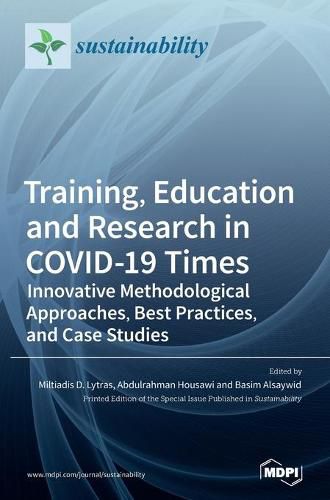Readings Newsletter
Become a Readings Member to make your shopping experience even easier.
Sign in or sign up for free!
You’re not far away from qualifying for FREE standard shipping within Australia
You’ve qualified for FREE standard shipping within Australia
The cart is loading…






This title is printed to order. This book may have been self-published. If so, we cannot guarantee the quality of the content. In the main most books will have gone through the editing process however some may not. We therefore suggest that you be aware of this before ordering this book. If in doubt check either the author or publisher’s details as we are unable to accept any returns unless they are faulty. Please contact us if you have any questions.
The global COVID-19 pandemic has posed a major challenge in all aspects of life, including how graduate training of healthcare practitioners is conducted. In Saudi Arabia, there were over 14,000 graduate health professional trainees in different stages of their training in various specialties distributed in many healthcare facilities across the country. The vast geographical distribution and diversity of health specialties training programs and activities have remarkably magnified the challenge posed by the pandemic. However, recently, the SCFHS implemented a health training governance reform that granted more autonomy to accredited training facilities in supervising training activities according to preset policies. This autonomy was crucial for mitigating various risks imposed by the pandemic, especially during the extended periods of strict lockdown.
The ultimate mandate is a knowledge management primer. We need to once again focus on the basics of human creativity and knowledge creation:
Create the content/knowledge;
Utilize knowledge;
Document knowledge;
Communicate knowledge;
Enable an integrated training, education, and research ecosystem;
Utilize the integrated platform.
Our volume is a contribution to the scientific debate for the added value of COVID-19 to our training, education, and research capabilities. We continue this debate with a new Special Issue in the Sustainability journal. We look forward to your contributions to this discussion.
$9.00 standard shipping within Australia
FREE standard shipping within Australia for orders over $100.00
Express & International shipping calculated at checkout
This title is printed to order. This book may have been self-published. If so, we cannot guarantee the quality of the content. In the main most books will have gone through the editing process however some may not. We therefore suggest that you be aware of this before ordering this book. If in doubt check either the author or publisher’s details as we are unable to accept any returns unless they are faulty. Please contact us if you have any questions.
The global COVID-19 pandemic has posed a major challenge in all aspects of life, including how graduate training of healthcare practitioners is conducted. In Saudi Arabia, there were over 14,000 graduate health professional trainees in different stages of their training in various specialties distributed in many healthcare facilities across the country. The vast geographical distribution and diversity of health specialties training programs and activities have remarkably magnified the challenge posed by the pandemic. However, recently, the SCFHS implemented a health training governance reform that granted more autonomy to accredited training facilities in supervising training activities according to preset policies. This autonomy was crucial for mitigating various risks imposed by the pandemic, especially during the extended periods of strict lockdown.
The ultimate mandate is a knowledge management primer. We need to once again focus on the basics of human creativity and knowledge creation:
Create the content/knowledge;
Utilize knowledge;
Document knowledge;
Communicate knowledge;
Enable an integrated training, education, and research ecosystem;
Utilize the integrated platform.
Our volume is a contribution to the scientific debate for the added value of COVID-19 to our training, education, and research capabilities. We continue this debate with a new Special Issue in the Sustainability journal. We look forward to your contributions to this discussion.